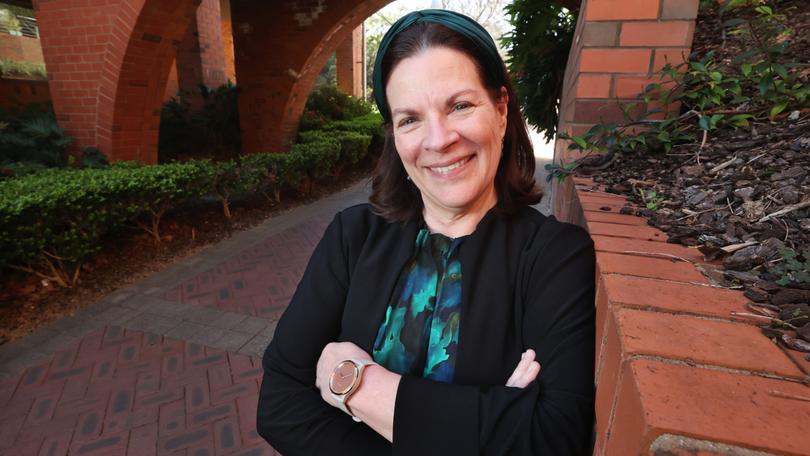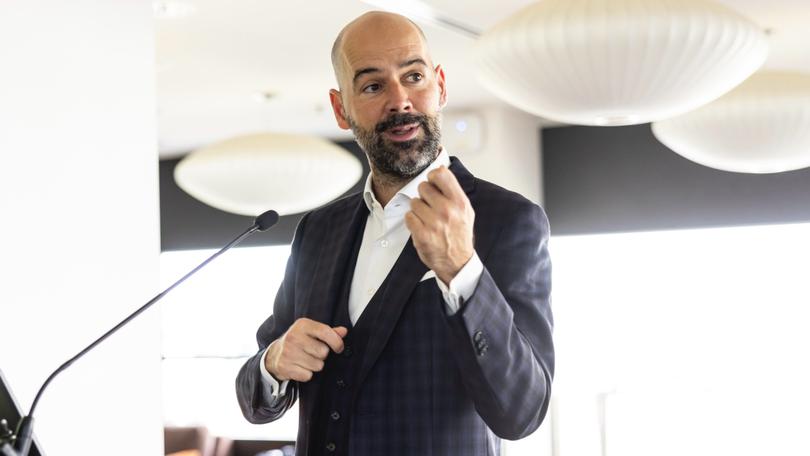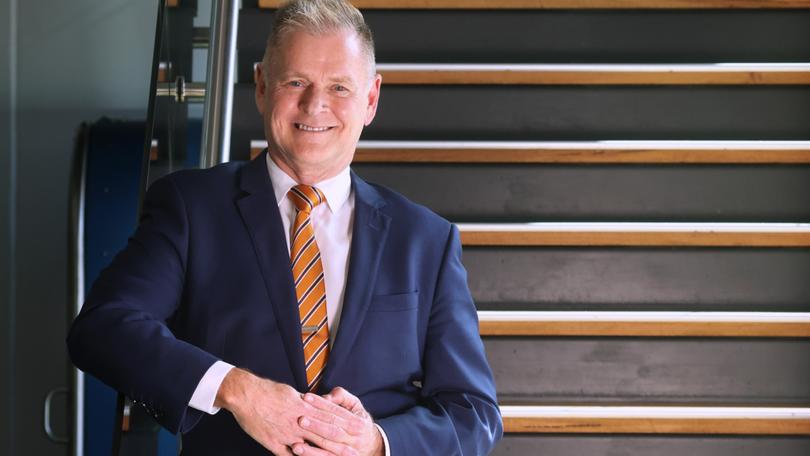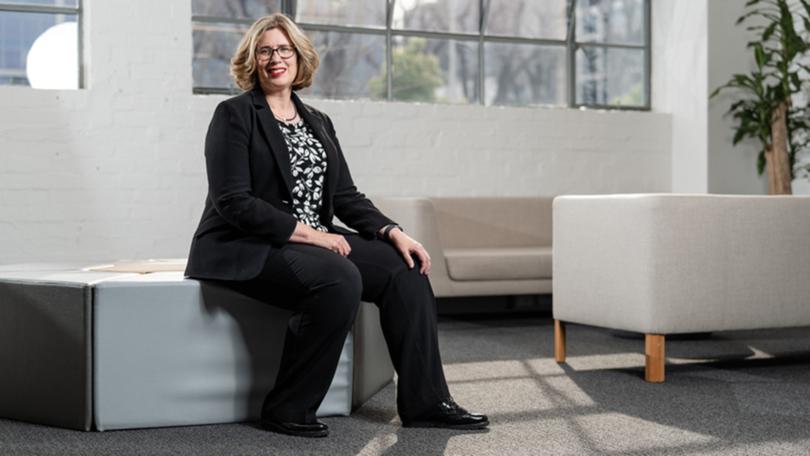The Nightly On Leadership: How our best and brightest educators are helping to shape Australia’s next leaders
We asked four leaders in the field of education for their insights and advice. Knowing your own strong points and taking time to reflect on what actually works are among their top tips for leadership.

We asked four leaders in the field of education for their insights and advice. Knowing your own strong points and taking time to reflect on what actually works are among their top tips for leadership
Professor Harlene Hayne, vice-chancellor of Curtin University
Curtin University vice-chancellor Harlene Hayne describes herself as a “reluctant” leader — despite leading more than 5000 staff overseeing the education of around 60,000 students at WA’s biggest university.
Sign up to The Nightly's newsletters.
Get the first look at the digital newspaper, curated daily stories and breaking headlines delivered to your inbox.
By continuing you agree to our Terms and Privacy Policy.“Deep down in my very core, I am still a teacher and a researcher, and so it wasn’t that I thought I couldn’t do it — it’s just that I thought I didn’t want to do it,” she says.
A psychologist by training, she was forced to rethink her attitude to leadership roles after being persuaded to become a head of school, then vice-chancellor at Otago University in New Zealand.
She took the helm at Curtin in early 2021, after a recruiter talked her into applying.

“What I’ve realised as I’ve gotten older and done this more is that there is huge satisfaction in the value of service,” she says. “So I treat my leadership role as a service opportunity.
“I think blind ambition is a very dangerous thing. One of the things that I have seen around the world is that hubris always gets you in the end, and so if your motivation for your job is serving others, you’re much less likely to demonstrate hubris than if your primary motivation is for your own glorification and your own satisfaction.”
She says leaders — whether in politics, businesses or universities — should focus on the fact “we’re all just stewards of whatever we’re looking after for a very short period of time”.
Some of the traits Professor Hayne rates most highly in leaders include compassion, empathy and curiosity. “I think for me, great leaders are people who understand that you’re leading people,” she says.
And while a leader does need to be able to sell their vision to the people they are leading, Professor Hayne says they also have to be someone that others want to follow: “the vision itself is not sufficient”.
“There has to be a person, or a group of people, or a leadership team behind that vision who say, ‘here, we’re on this bus, and we’re having a great time — get on board!’ And that’s what we really try to do here.”
One of the things that I have seen around the world is that hubris always gets you in the end,
When it comes to educating leaders of the future, Professor Hayne says Curtin is in a unique position as a young, nimble university that “sits right at the doorstep of industry”.
“What you really need to be, in my view, is a great observer of leaders, and then adding to your basket of knowledge those things that you see that are valuable,” she says.
Professor Hayne’s key nugget of advice to leaders of the future is simple: “know thyself”.
“I think it is so important to spend that time understanding who you are as a person ... what are your strengths, what are your weaknesses — and play to the former, downplay the latter.
“If you can shape the role to fit who you are as a person, you’ll be much more effective, but you’ll also be happier than if you’re trying to lead by some rigid mantra that someone else has told you.
“So in all instances, I think know thyself is actually a huge key to happiness in whatever we’re doing.”
Professor Frederik Anseel
Professor Frederik Anseel is dean of the UNSW Business School:
There is no such thing as a recipe for leadership, according to the recently appointed dean of University of NSW business school Frederik Anseel.
It’s a question he encounters frequently, and one he finds frustrating.
“People always want these recipes for success,” he says. “They think there are simple behaviours or skills that one can teach, and there are, of course, a few technical skills that you can learn, but that is not what makes a leader.
“It is more complicated than this. You have all sorts of leaders that are effective, and people will have their own style that fits with their own personality, their identity and the company they’re working in.

“But what people need is to develop — and this is the hard part — an identity as a leader, and a way of relating to the people that they’re going to lead. That is not something that is easily learned in a recipe, because good leadership goes quite deep.”
Born and raised in Belgium, Professor Anseel came to Australia in 2019 after helping to start a business school at King’s College London. Trained as an organisational psychologist, his research has focused on how people and organisations learn and adapt to change.
According to Professor Anseel, good leaders are not defined by some sort of behaviour or vision, but by the people they are leading.
Even though leaders may have completely different leadership styles, he says people expect three things from them — that they know what they’re talking about, that they can be trusted and that they care about their followers.
His focus at UNSW is on developing future leaders by helping them to form their identity by learning from experience.
“It’s leadership development that is more than just a set of technical skills, but it’s shaping the whole person,” he says. “That requires creating an environment where people reflect, act, think back, become more self-aware, experiment with new behaviours, with new ideas.
You have all sorts of leaders that are effective, and people will have their own style that fits with their own personality, their identity and the company they’re working in.
“That also means we want to give every student a bit of industry experience, because you can learn about the theory and academic principles about leadership in the classroom, but then you need to create self-awareness about how you behave as a leader — and you can only do that by being confronted with actual practice and the industry experience.”
Despite the need for constant reflection to become an effective leader, Professor Anseel says it’s something that many people find difficult. In fact, a study carried out 10 years ago at University of Virginia in the US found that most people would rather receive an electric shock than be left alone with their thoughts.
“People hate reflecting, actually,” Professor Anseel says. “And that’s why coaching for leaders is often such a success because you do it in conversation with somebody else. You get challenged, you get asked questions and it helps the deep type of reflection that you need, because it’s so hard to do on your own.”
Emeritus Professor Gary Martin
Emeritus Professor Gary Martin is chief executive at Australian Institute of Management WA:
Gary Martin has a lifetime of experience in both leadership and education.
Before becoming chief executive of WA’s peak leadership training course provider, the Australian Institute of Management WA, he was senior deputy vice-chancellor of Murdoch University.
He believes a problem that many people still face is being pushed into leadership roles with little or no support. And while there are now many more courses available in leadership and management, the journey towards leadership is still complex.
“It doesn’t just happen for most people, you don’t just suddenly become a leader,” he says. “Very few people suddenly become a team leader and experience enormous success.

“It’s actually very incremental; and the success is slowed right down if you don’t have either that support or someone guiding you, like a coach or a mentor or someone that you can work with to say, ‘I’m encountering these sorts of situations, how should I respond?’”
Emeritus Professor Martin credits some of his own leadership skills to the five years he spent working as a primary school teacher, before becoming an education lecturer and taking on management roles in research and development.
“Primary school teaching is all about how to work with children, how to work with adults from all different backgrounds, parents, other teachers, students,” he says. “And if you can’t relate to those different groups of people you encounter, you don’t get anywhere. So it kind of comes back to that capacity to build relationships in the first place.”
Teaching also demands planning, organisation and an understanding of the value of reflection.
“You’ve got to be able to lead yourself before you can lead others,” he says. “In the teaching profession, that’s exactly what you have to do. You’re taught after every lesson to try and reflect on how it worked.
“You’re taught that you should reflect on your interactions with people, whether it’s the teachers, principals, parents and so on, so that’s a really good grounding, I think, in terms of becoming a leader.”
Professor Martin believes Australian universities could do more to elevate the importance of practical experience as a component of a business degree.
You don’t just suddenly become a leader. Very few people suddenly become a team leader and experience enormous success.
In other parts of the world, such as Britain, the concept of degree apprenticeships combining coursework with on-the-job experience is becoming more popular.
“Typically, in the UK, you’re getting paid while you study,” he says. “And mostly people stay in those sorts of roles post-graduation. So it’s really an interesting model.”
Professor Martin argues there are many aspects of leadership which can’t be taught, that have to be learnt on the job.
“The taught part of it is you need the concepts, the ideas, the case studies … so you can formulate your own ideas, and then you learn on the job as you go along,” he says.
“You just keep learning all the time. You learn what to worry about or not worry about. You learn resilience. You learn you’re not going to please people all the time.
“You learn things about where you need to put people first before organisational needs and trying to get that balance right — none of that you actually get taught.”
Professor Jenny George
Professor Jenny George is dean of Melbourne Business School:
There is a vast difference between being a leader and being a manager, according to the head of Australia’s top-ranked business school.
Dean of Melbourne Business School Jenny George says management is about a role, whereas leadership is about “who you are”.
This means that aspiring leaders need to understand themselves, be able to communicate effectively and be able to inspire trust in others.
“It’s not just managing via a role. It’s actually turning yourself into a person who is inspiring and visionary, who can set an agenda for change and have people want to follow them through that change,” she says.

“People need to be able to trust you. They need to understand and see the vision that you have.”
But she cautions against “expecting the impossible”.
“You can’t turn into a person you’re not. So it’s also about understanding who you are, and therefore what is the particular type of leader you’re going to be, and being true to that, and then making sure that you have got all of the support you need in place for the inevitable weaknesses that every single leader always has, and that those don’t derail you.”
Before her appointment as dean last year, Professor George spent 17 years as an academic and seven years as chief executive of Converge International, one of Australia’s largest providers of mental health services to workplaces.
She believes that experience gained outside the halls of academia has been “essential” to her role as dean. But she is also adamant that all the theory she took from her academic training “absolutely” worked in practice. That’s why she tells people not to disdain theory, because it is actually “distilled wisdom” of more practical experience than they could have in a lifetime.
People need to be able to trust you. They need to understand and see the vision that you have.
“When I moved into a CEO role, I had not had practical experience as a CEO before, but the theories actually enabled me to tap into hundreds of people’s experiences of CEO roles, of operations, of marketing, of finance, and that actually had enormous practical relevance.”
Professor George says one of the reasons Melbourne Business School is ranked No. 1 in the nation is because it is partly owned by the business community.
“So I report to a board, and that keeps us very honest about whether what we’re doing makes sense, is relevant, and how we then turn that into something that’s valuable to the business community,” she says.
“That does make a difference. It means that we tailor our educational experiences, but we even tailor our services around what makes sense to our students.”
“And that flexibility and ability to do exactly what makes sense is quite unusual, and I think makes our education of a higher quality and certainly more targeted and focused.”
